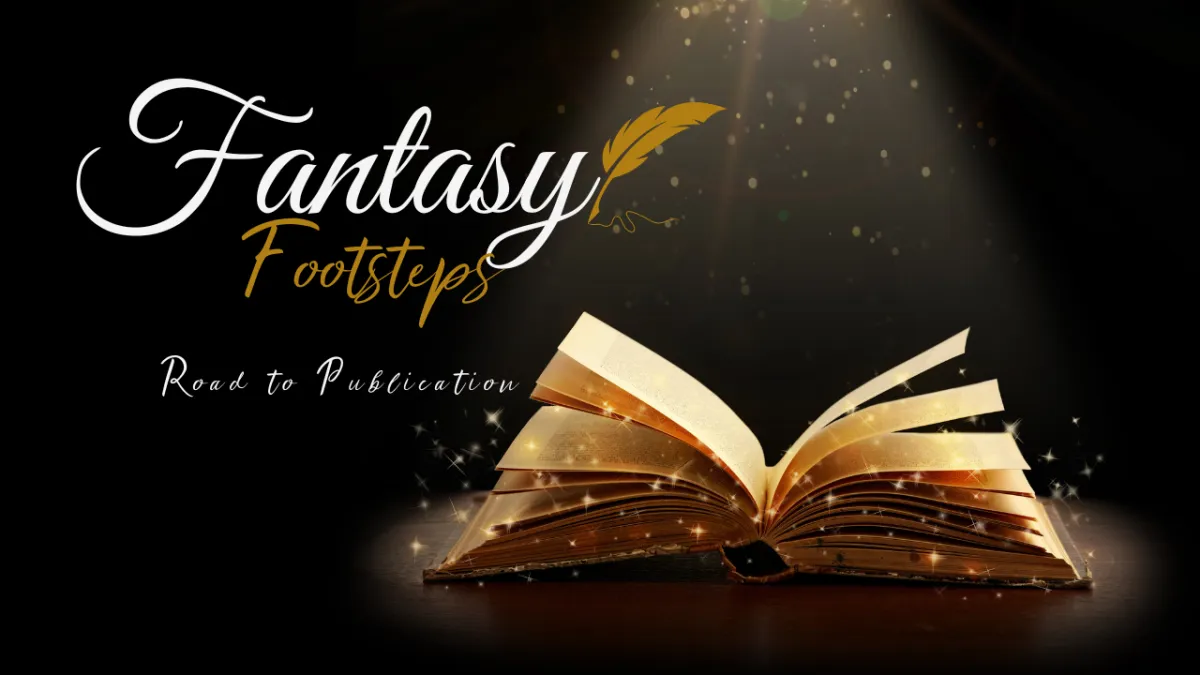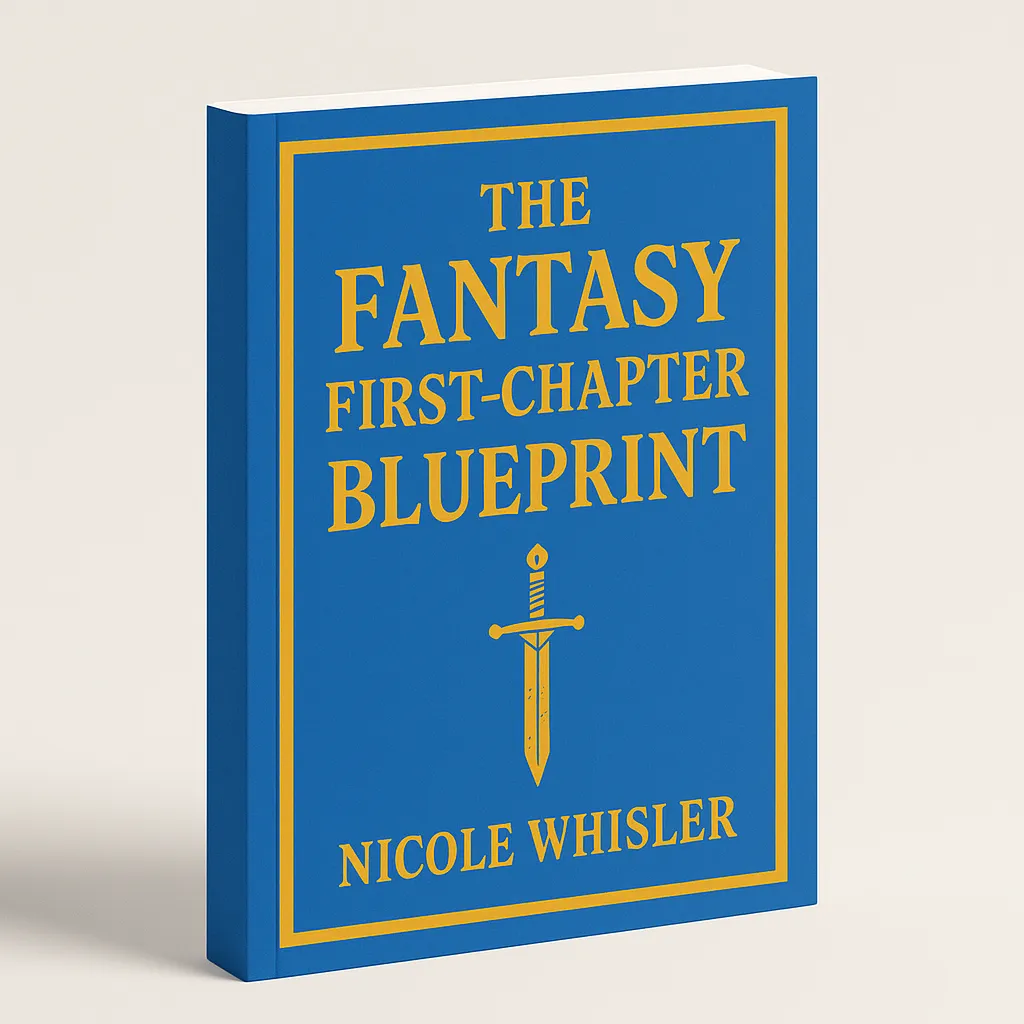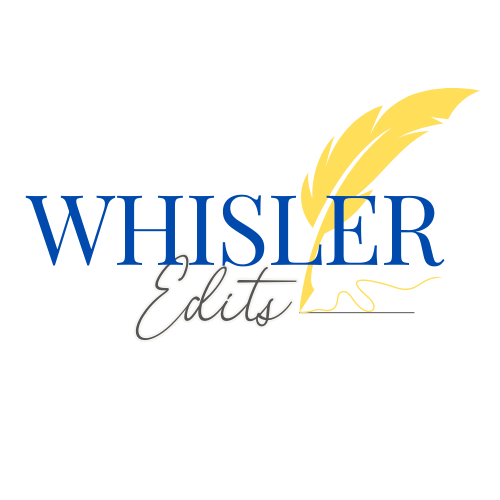The Fantasy First-Chapter Blueprint
Your first chapter is your one shot to hook an agent or a reader. Don't let the 7 deadliest mistakes land your manuscript in the rejection pile. This free 7-day email course gives you the step-by-step blueprint to avoid them and craft an irresistible opening.

Your Novel Matters ...
Looking for the right book coach for your fantasy novel?
Are you a fantasy writer …
… struggling to convert the vivid scenes of your fantasy novel from your imagination to the page?
… stuck in a loop where you constantly rewrite your opening pages?
… worried your story won’t resonate with your readers?
What if I could show you the exact steps week to week that would take you from brainstorming and drafting to revising and publication?
I specialize in developmental editing and book coaching for writers of fantasy novels—writers who value the craft of storytelling and wish to create stories that resonate.
My Services
Develop Your Ideas
Fantasy Footsteps: Road to Publication

I’ll let you in on a secret. All you need to succeed as a writer are three things:
A Roadmap: Illuminate your path with a step-by-step guide, ensuring you achieve your writing goals every week. From outlining to publishing, every stage of your journey is mapped out for success.
Mindset Mastery: Learn how your thoughts control your outcomes in your writing. Overcome self-doubt and unearth the confidence that will bring your unique ideas to life on the page.
Personalized Support: Prepare for comprehensive assistance, real-time accountability, and feedback tailored to your needs. From brainstorming sessions to final publication, you'll have a dedicated ally guiding you every step of the way.
With these three pillars, you'll unlock the potential to:
Craft a captivating story that enthralls readers from the first page to the last.
Develop complex characters and immersive worlds that resonate deeply with your audience.
Navigate the complexities of plot twists and pacing, keeping readers hooked until the final chapter.
Receive specific guidance on refining your scenes so that readers root for your protagonist.
Overcome writer's block and stay motivated throughout your writing journey, ensuring consistent progress.
Transform your rough draft into a polished, professional manuscript ready for publication.
Are you ready to turn your fantasy novel from a mere vision into a masterpiece that captures hearts and minds?
Join Fantasy Footsteps: Road to Publication and begin your author journey with everything you need to write a story that works.
Don't let your story remain trapped in your mind—bring it to life with me!
If you’re thinking, “Yes, please! Tell me what to do!” , I’d like to invite you to work one-to-one with me to finish your novel and write a story that works. Join my book coaching program designed specifically for fantasy writers—Fantasy Footsteps: Road to Publication.

Discover Helpful Tools
Resources For Writers
Here you will find some of my favorite resources for writers.
Add these books, podcasts, websites, and other resources to your writing toolbox to augment your writing at any stage.
Join My Free, Private Facebook Group
Finish My Fantasy Novel: Write & Revise My Best Book in 6 Months
In the group, I go live weekly with writing tips. The group is also a platform for writers to support each other and share their wins and progress.
Live training schedule:
1st Tuesday of the month: Free critique for someone in the group!
2nd Tuesday of the month: Writing sprint with fellow writers
3rd Tuesday of the month: Live training on a specific topic
4th Tuesday of the month: Interview with an author or marketing/business expert


Improve Your Craft
Writing Advice Blog
As a developmental editor and book coach, everything I post is designed to help you build your creativity, strengthen your prose, and explore new avenues in your writing. The opinions in each post are my own, but many are inspired by ideas from established authors and editors who excel in their fields.
Rely on my blog for clear and specific writing advice, motivational tips and grammatical aid, and interviews with experts!
Hi! I'm Nicole.
I’m a Developmental
Editor & Book Coach for Fantasy Writers.
Like you, I'm a writer. I understand the mental and emotional ups and downs of storytelling. Don't let resistance win! Recognize the value of good advice plus hard work.
My approach to novel writing is multifaceted. For a deeper understanding of my process and style, take a look at some of my favorite craft-of-writing books in my Resources section.
What can I say about myself? I read, I write, I read about writing, and I write about reading. It never gets old to me.

See what writers like you are saying . . .

Nadir Shirazi
“I’ve been stalling on my Islam-inspired sci-fantasy series for 10 years. But within 10 minutes of starting Nicole’s program, I started writing again."

Amanda Emerick
“I can’t recommend Fantasy Footsteps enough to writers who are legitimately looking to polish their craft, write, and eventually publish their novel."

Trinity Cunningham
“I loved discussing my story with Nicole. She provided me with invaluable insights I never would have considered on my own."
Latest on the Blog

You will find no pictures of kittens here. No images of favorite dessert recipes, snapshots of my recent vacations, videos of puppies playing the piano (although I do love dogs), or YouTube clips of monkeys stealing people’s sunglasses.
I’m genuinely sorry if that disappoints you.
Instead, you can rely on my blog for clear and specific writing advice, motivational tips, grammatical aid, and author/editor interviews.
As a developmental editor & book coach, everything I post is designed to help you build your creativity, strengthen your prose, and explore new avenues in your writing. The opinions in each post are my own, but many are inspired by ideas from established authors and editors who excel in their fields.
Some of these tips might be just what you need to hear. Others might not work for you personally, and that’s okay.
Apply the tips that fit your personality and writing habits, and feel free to adapt or ignore the others. For further questions and comments, you can email me or reach me through my Contact page.

Premise vs. Plot: Don’t Let Your Story Idea Fizzle Out
Discover in this post …
the difference between premise and plot.
examples to illustrate that difference.
how knowing the distinction can help you on a practical level.
A Promising Premise
Have you ever started writing a novel only to doubt whether it has enough promise to continue? How far were you in your project? In the brainstorming stage? On Chapter 4?
Or worse—halfway through the book?
When ideas fizzle out and we stop writing, it might be for a variety of reasons. But often, the problem isn’t with the idea. The problem isn’t that we chose the “wrong” concept to write about, that the product of our imagination is inherently flawed. Rather, the problem usually stems from not taking the time to fully flesh out our original idea—to turn our premise into a plot.
Let’s define each term to make sure we’re on the same page, then look at an example.
Premise = the specific situation on which a story is based
Plot = how the writer chooses to unveil the consequences of that situation on the characters
Premise and plot aren’t interchangeable. If you’re the type of writer who leaps from idea to idea, constantly reaching for something better or more exciting, first take a look at your premise to see if you fully fleshed out your idea from the start.
Examples of Premise vs. Plot

This concept is somewhat hazy until we talk specifics. So let’s dive in! Decide whether you consider the following paragraph a premise or a plot:
“For the past decade, fourteen-year-old Gabby LaRue has been shunted around to different foster homes in her magical community. Since her caretakers never seem fond of her, she doesn’t think highly of them either. In fact, she prides herself in stealing one magical item from every residence in which she has lived—and she’s never caught. But in her latest home, her caretakers seem different … almost like they’ve met her before. They watch her every move and know details of her background she’s never told them. Gabby swears they’ve even assigned students to befriend her at her new magical school.”
What do you think? Premise or plot?
If you found yourself asking, “... And? So what?” about Gabby’s situation, you’ve stumbled upon the exact method to distinguish between the two terms. The above description about Gabby is a premise, not a plot. It provides a background that will act as the springboard of events to come, but it doesn’t contain the subsequent events themselves.
Consider how many directions you could take the above premise, and consider the possible consequences of each direction. (I’d love to hear your own ideas in the comments!) Here’s the start of three plots, all completely separate, based on the premise above:
Gabby investigates her new caretakers on her own and discovers that they run an underground “circus” of sorts, a weekly performance in which teenagers with uncanny abilities are the stars! But most of the teenagers aren’t there of their own free will, so Gabby attempts to expose the next performance for the trafficking it is—only to discover that the leading stars don’t want to be unveiled after all. They’d rather be left alone. Or better yet … make Gabby disappear. (Now we’ve got a fantasy thriller on our hands.)
Gabby’s new caretakers have tracked her long-term, convinced she possesses a rare magical ability: a talent for finding lost items. They’ve spent years searching for their missing son, so when Gabby confronts them about their odd behavior toward her, they confess everything and beg her to help them find their boy. They strike a bargain: Gabby names a financial sum in return for three months of her help. But Gabby, cold and distant as a result of her upbringing, never expected to fall in love with the missing boy’s family and find belonging of her own. (Now we have a mystery and a theme of what it means to truly belong.)
Gabby’s new caretakers turn out to be her real parents. Long ago, they were magical undercover assassins, a job that placed their immediate family in extreme jeopardy, so they sent Gabby into the foster system as a child, having convinced themselves it was the only way to save their little girl. But the danger is gone at last, and now they want their daughter back. The only problem? Gabby wants nothing to do with them—and the more she finds out about their backgrounds, the more she tries to run the other way. Because they’ve said the past is the past, but Gabby finds new evidence about their activities that contradicts that claim. (Now you’ve got a story that asks questions like, How strong are family bonds? Can you forgive your parents for doing horrible things in the past if they swear they did it all for your safety? Would you turn them in for the illegal acts you believe they’re still committing—or would you look the other way?)
Notice a few items about the expanded plots above:
Each plot identifies what the protagonist wants and what she does to get it. This must be present and clear for your protagonist to move the story forward. (Keep in mind that you could choose to tell the stories above in multiple points of view. You could even tell the third storyline solely from the caregivers’ perspective. If you’re using a single point of view, the protagonist usually works best when they’re the person with the most at stake.)
The plots touch on the theme of belonging (at least the second and third ideas do, and you could integrate a similar theme into the first). When you’re expanding on your premise, consider weaving in your story’s theme. Rather than limiting your plot to what your protagonist wants, include what they need. Their core need will typically relate to the overall theme of your novel. Themes help readers connect to stories on an emotional level. They allow readers to understand not only what is happening, but why it matters.
To get even deeper into your plot, of course, don’t forget to question, question, question. Throw inquiries like the following at your brain, then see if they trigger further ideas:
Why might that happen?
How might my protagonist react to that? What are the consequences?
Who has the most to lose in this situation?
What if XYZ happened too? How would that change the next events?
What potential twists could I include with that?
Now that we’ve identified the key differences between premise and plot, you can expand on your own premise. Unravel it, examine it from different angles, and be sure you’re not missing out on your idea’s hidden potential.
Why Know the Difference between Premise & Plot?

Here are three main advantages to expanding your premise into a plot as early as possible:
The more you understand the consequences that result from your story’s premise, the more questions you’ll ask, the more ideas will occur to you, and the lower the chance your original idea will fizzle out, as I mentioned above. Once you’ve trained your brain to focus on the possibilities, you’ll be excited to get those ideas down on paper—and motivated to continue.
If you intend to publish traditionally, you’ll have the meat of your query letter at the ready. Make sure to include aspects of the plot itself rather than stopping at the premise. Agents don’t want to understand the mere premise of what you’re writing. They don’t want your query letter to stop at the inciting incident, as query letters often do. They want to know how the story unravels and why the inciting incident matters. That alone will help your query stand out!
No matter what type of publishing you’re planning, by expanding your premise into a plot, you’ll have an at-the-ready pitch you can make to your ideal readers, friends and acquaintances who ask about your story, and agents or editors at a writing conference. You can practice it and refine it until you know it by heart. And with familiarity comes confidence.
Have you examined the premise of your story yet? Thought about whether you’ve already developed it into a plot? If not, now is the time!
Thanks for reading! Today I’ve discussed the difference between premise and plot, delved into examples of each, and touched on how unfurling your premise can help you keep your story ideas going strong. How do you approach premise vs. plot in your own writing? Do you tend to expand on your ideas naturally, or do you start with a premise and simply hope you’ll stay motivated and excited as you write? I’d love to hear about your method in the comments!
Do you want to learn how to write a story that makes your target readers stand up and cheer? If you’d like support from A to Z (from brainstorming to drafting to revising to publication), book a Discovery Call with me to see if you’re a good fit to join my book coaching program, Fantasy Footsteps: Road to Publication. And if you haven’t done so already, grab your Free Guide on how to hook readers from your story’s start!

Capture Your Readers from Your First Scene
Get my exclusive blueprint—7 Mistakes to Avoid in Your Fantasy Novel’s Opening. Start your fantasy novel right!
Are you worried you've failed to establish a bond between readers and characters in your first chapter? Do you wonder if you've bogged readers down with your worldbuilding? Do you sometimes overlook essential conflicts? Many readers will put your book down if it doesn't grab their attention right away, so it's vital to evoke powerful emotions from readers as early as possible.
Don't let these common mistakes rob your story of its magic and momentum. Save your precious time and energy by ensuring you hook readers from the start. Grab your guide now and check your opening against these common missteps!
(You will also receive monthly writing advice, updates about my free live trainings, and direct access to replays. Unsubscribe anytime.)

